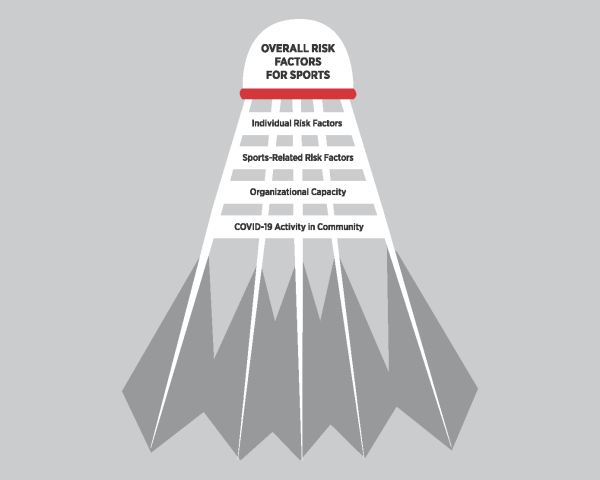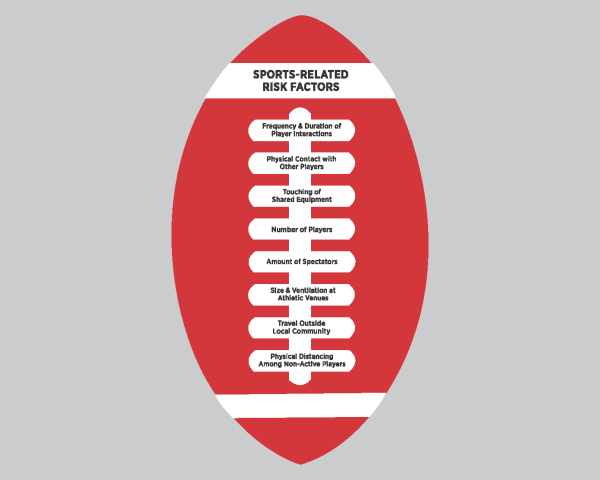After months of virtual services, America’s churches are beginning to open their doors. Pastors—and particularly youth pastors—face a challenging situation: how to restart sports ministries. With over 60,000 gyms inside church buildings in America, the community life of many Christians relies on exercise and athletics, whether it’s casual games at fellowship gatherings or a more formalized sports league. Parachurch ministries like the Fellowship of Christian Athletes and Upward Sports exist in all 50 states and over 93 countries, the latter having served more than 7 million kids playing basketball, football, baseball, softball, soccer, volleyball, and cheerleading. These activities can help teach a valuable lesson forgotten by so many churches: Our body is a temple of the Holy Spirit, and engaging in physical exercise can encourage us to worship God. How can we continue teaching these lessons, even as our country slowly recovers from a global pandemic?
As a pastor and former CDC medical officer, I’ve had questions like these on my mind for some time now. From a pastoral perspective, I yearn for congregations to embrace the gift of exercise while rediscovering Christian community in sports—particularly after months of lockdown. But from a medical standpoint, I know how devastating COVID-19 can be and how important it is to value the sanctity of life.
Before the quarantine, our church hosted a weekly basketball ministry at a local public school in New York City. Every Monday night, church and community members laced up their high-tops while sharing the parquet. From hard fouls to rainbow threes, non-Christians witnessed the fellowship of believers while engaging in four-on-four tournaments. The friendships forged during basketball games emboldened church members to be intentional about evangelism. In time, they preached the gospel, winning over souls for the kingdom of God.
With COVID-19, our current situation is complex. There is no one-size-fits-all plan that will work for every congregation; each church is different, and every church leader must closely monitor the situation in his or her area. That said, I’ve developed four general principles that all church leaders can bear in mind as they figure out how to build sports community while still prioritizing safety.
Principle One: Exercise is redemptive
One of the reasons social distancing has been so painful is that we can’t exercise in the ways we usually would. With gyms closed and youth sports canceled, it’s not just our bodies that are exhausted—our minds and spirits grow weary as well.
As temples of the Holy Spirit, our bodies are meant to worship God (1 Cor. 6:19). While we praise him with songs and spiritual hymns, we honor him by exercising, eating healthily, and crucifying the desires of the flesh (Gal. 5:24). The choices we make either redeem our bodies or destroy them.
While exercise is a natural component of physical health, it positively affects our emotional and spiritual well-being as well. Physical activity releases endorphins that improve our mood and overall emotional health, leading to decreased stress, anxiety, and depression. Improved sleep and increased energy levels allow us to flourish while worshiping God.
Pastors can safely encourage their congregations to honor God by redeeming their bodies through regular exercise. The Aspen Institute has issued helpful guidance on low-risk activities players can follow for each sport. Team coaches can provide players with at-home workouts or lead virtual training sessions.
These activities will not only help us stay in shape but also will lift our spirits while empowering us to thrive holistically.
Principle Two: COVID-19 risk varies among individuals, communities, and sports
While there are varying risks to take into account, churches can consider changing their sports offerings to safely meet their community’s needs. Given higher levels of risk within private gyms and community athletics, churches can fill the gaps left by them. This includes offering meaningful and safe ways to exercise that foster fellowship within church facilities. Churches can host smaller gatherings of individuals of similar life stages during initial phases of state re-opening plans before other entities can re-launch.
Overall, church leaders should begin to gauge infection risk using these factors: COVID-19 infection rate within the community, organizational capacity to maintain healthy environments, characteristics of particular sports, and individual risk (Figure 1). Active outbreaks within local communities where sports are being played present considerable risk for disease transmission.

When it comes to COVID-19, not all sports are created equal. Sports-related risk factors include the frequency and duration of interactions between players, physical contact with others and shared equipment, number of players and spectators, and athletic venue (Table 1). Individual sports like golf pose less risk than team-oriented activities such as basketball. Golf clubs and balls are used exclusively by a golfer, while a basketball is shared among players.

High-contact sports like wrestling are riskier than low-contact ones such as tennis. Wrestling requires frequent and sustained contact, while physical distancing occurs naturally in tennis. And with increased ventilation and airflow, large outdoor spaces are safer than small, confined, indoor facilities.
Additionally, as clusters of outbreaks continue to occur in specific areas, playing in local communities is safer than traveling across state lines for multi-game tournaments. More mature athletes are better prepared to engage in social distancing practices compared to young children who may lack self-control. Some sports activities, especially for the very young, may be better kept to the home field.
Another easy way for churches to reduce transmission of the virus is to implement new guidelines restricting crowd sizes and keeping visitors to a minimum. We certainly shouldn’t be filling bleachers and packing gyms. Parents derive great joy from cheering for their children during practices, games, and tournaments. Unfortunately, the high risk of transmission among large crowds is the reason why professional sports leagues are considering holding games without spectators. While infection control procedures like wearing masks or staying six feet apart are helpful, parents should drop off and pick up youth instead.
As group gatherings become more common across various states, coaches and church leaders should think critically about the risks of beginning youth leagues again. The CDC has provided guidance on how coaches can modify practice and games to enhance safety and reduce the likelihood of transmission.
Principle Three: Parents should determine an organization’s ability to maintain healthy environments
Churches and leaders should be prepared to answer questions from parents regarding their operational strategy to maintain a safe and healthy atmosphere for all participants. They should have a plan to effectively communicate all the safety measures in place while upholding all state and local regulations.
The past few months have been incredibly exhausting for many parents. Not only do they manage to work full-time from home (or look for work full time), but they also homeschooled increasingly restless and high-strung children.
The stress is enough to make any parent leap at the opportunity to get their kids outside exercising with friends. But before signing up for sports camps or dropping off kids for practice, parents should consider whether the organization sponsoring an activity can feasibly provide a safe environment for play.
They should not shy away from asking tough questions to coaches and church leaders about how they plan to maintain safety and decrease infection risk. What infection control and prevention practices will be adopted during practice and on game day? What strategies will be implemented to support healthy operations within the organization? When a player gets sick, what protocols will be followed, and how will they be communicated?
Principle Four: Sacrifice is a core value of team sports and a central tenet of the gospel
In Philippians 2:4, Paul encourages believers to “look not only to [their] own interests, but also to the interests of others” (ESV). We do so because Christ emptied himself, taking the form of a servant to offer salvation for those who believe in him.
Every family is unique. Some families are paralyzed by worry about the virus; others are skeptical of the threat it poses—most are somewhere in between. Children with special needs or preexisting medical conditions, like asthma and heart disease, are at higher risk for complications. Families with grandparents living in the home may choose to refrain from high-risk sports.
The willingness to look to the interests of others is a hallmark not only of the Christian faith but of all successful athletic teams. As our country begins to open back up, we must continue to exhibit humility and sacrifice. We won’t be able to go back to full-contact sports or travel leagues immediately, nor will church gatherings and fellowships look the way they did before. The more we embrace these sacrifices, the better we model the love of Christ to the world—and the better example we’ll provide to our children.
If the past few months have taught us anything, it’s just how frail our lives are. When life is going well, we can deceive ourselves into thinking that we are in control of everything. Pandemics teach us otherwise. They remind us how little control we truly have and how much our lives are in the hands of God.
As humans, it’s easy to forget these lessons. Participation in sports can help us remember. The teamwork, discipline, and humility that athletics require are important for any team—but for the Christian life, they are essential. The writer of Hebrews urges us to “run with endurance the race that is set before us” (12:1). Sports ministry can draw our congregations closer to God while helping them develop perseverance, faith, and hope.
Stephen Ko is the senior pastor at New York Chinese Alliance Church , an adjunct professor at Alliance Theological Seminary, and formerly a CDC medical officer and professor of global health at Boston University. Follow him on Twitter @drsteveko.











